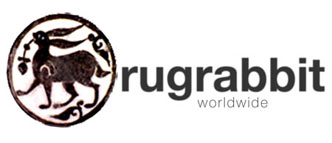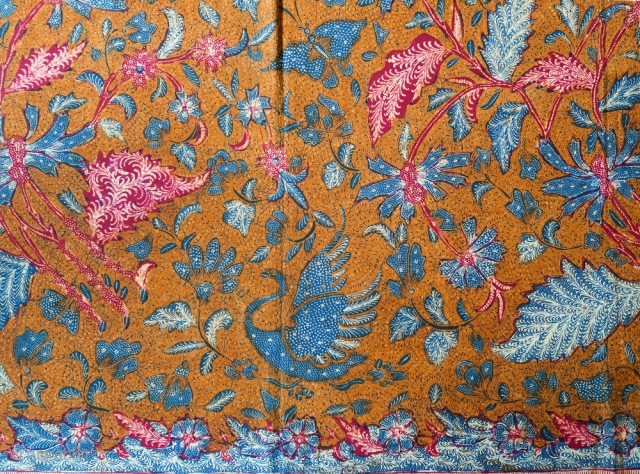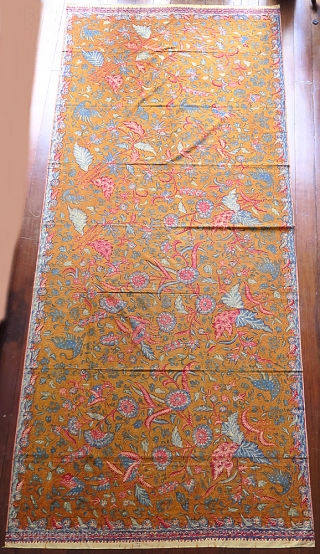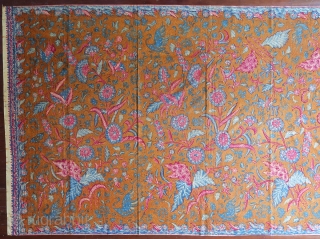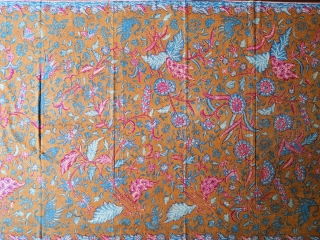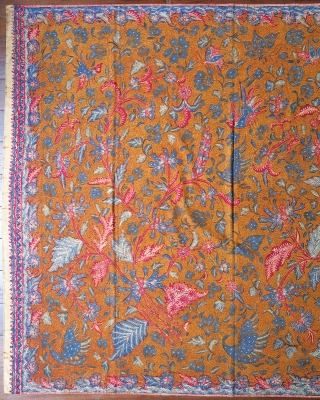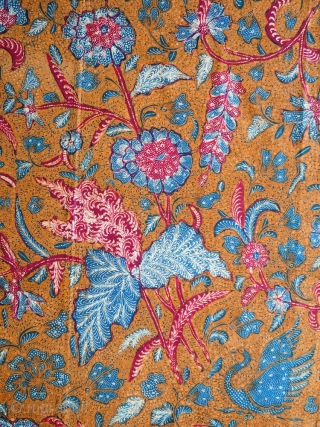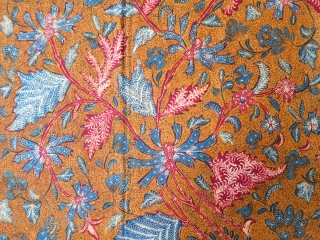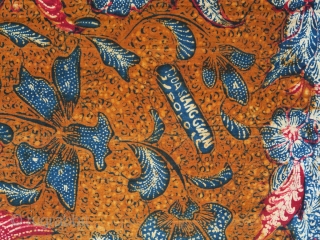Back
Java | Batik Waistcloth made in 3 States (Kain Panjang Batik Tiga Negeri) | Indonesia
Java, Solo / Lasem / Pekalongan, 1950 - 1960
A fine waistcloth (kain panjang) hand-drawn separately in Solo, Lasem, and Pekalongan to create a rich, dramatic design that blends their 3 distinct styles. The sparkling blue petals and swans drawn in Pekalongan are filled with different tiny patterns, enhancing the richness of the design; the warm, golden soga brown bands drawn in Solo have soft cream dots (cocohan) that represent rice seedlings, thus making the whole design a metaphor for padi. The flower centers, stems and long red leaves drawn in Lasem are detailed with. The 3 different styles create a graduated contrast of soft brown ground overlaid with bright crisp blue-and-white detail and intense, dramatic red highlights – a uniquely luxurious, yet delicate, effect.
The design is also a pagi-sore (morning-evening) one, i.e. bisected along a diagonal in the center, such that each half has a different pattern. In this case the differences are subtle: one half, which carries the maker's signature (image B2b), has bouquets of a round magnolia flower (cempaka mulya) motif, which gives the design a stately character. The other side (image B2a) has more loosely organised bouquets of chrysanthemum flowers with serrated petals, and has flying creatures: a butterfly and two birds with red heads in the Lasem style. Image B2c shows the center of the design where both halves merge along an invisible diagonal. The piece is signed in the corner by the maker: “Tjoa Siang Gwan, Solo”.
Context: Tiga negeri batik evolved from dua negeri (2 states) batik, which often organized a more simple division of styles between 2 parts of the design. Whereas dua negeri could be copied in one workshop, it was extremely difficult to simulate the expertise required for 3 different styles. This tiga negeri batik was commissioned by Tjoa Siang Gwan in Solo, and sent for waxing and dyeing of the principal designs to Pekalongan for the blue portions of the design, and to Lasem for the red portions. When it returned to Solo, the background was completed in traditional central Javanese motifs and colors. The batikers in central Java had considerable freedom with the background and final design of the textile; the lovely cocohan drawn in Solo on this batik is now a lost technique. The Tjoa family were Peranakan Chinese batik entrepreneurs, and one of the foremost tiga negeri batik-makers. Tjoa Siang Gwan's grandfather, Tjoa Giok Tjiam, began his batik workshop in 1910.
The intention of the genre was to combine the best of the different regional styles of batik. Tiga negeri batik was the most expensive batik of its time: whilst the entrepreneurs may have saved costs by getting the background made in central Java, where batik labor was cheaper, the coordination and transport required also multiplied costs. As a luxury item that declared one’s status, tiga negeri batik was worn by wealthy Peranakans who wished to show their affiliations with traditional Javanese culture, and was also favored as informal private wear in the central Javanese courts. Its cosmopolitanism had the inadvertent effect of making the batik styles of one region familiar in another, leading to the greater sharing of motifs.
Condition: The textile is in excellent condition with no notable holes or tears. The red is deep and vivid, the blue fresh and glowing, and the soga brown is rich and unfaded. The cotton is of the highest grade, fine, smooth, thick and waxy, and quite crisp and cool to the touch.
246 cm x 106 cm.
Java, Solo / Lasem / Pekalongan, 1950 - 1960
A fine waistcloth (kain panjang) hand-drawn separately in Solo, Lasem, and Pekalongan to create a rich, dramatic design that blends their 3 distinct styles. The sparkling blue petals and swans drawn in Pekalongan are filled with different tiny patterns, enhancing the richness of the design; the warm, golden soga brown bands drawn in Solo have soft cream dots (cocohan) that represent rice seedlings, thus making the whole design a metaphor for padi. The flower centers, stems and long red leaves drawn in Lasem are detailed with. The 3 different styles create a graduated contrast of soft brown ground overlaid with bright crisp blue-and-white detail and intense, dramatic red highlights – a uniquely luxurious, yet delicate, effect.
The design is also a pagi-sore (morning-evening) one, i.e. bisected along a diagonal in the center, such that each half has a different pattern. In this case the differences are subtle: one half, which carries the maker's signature (image B2b), has bouquets of a round magnolia flower (cempaka mulya) motif, which gives the design a stately character. The other side (image B2a) has more loosely organised bouquets of chrysanthemum flowers with serrated petals, and has flying creatures: a butterfly and two birds with red heads in the Lasem style. Image B2c shows the center of the design where both halves merge along an invisible diagonal. The piece is signed in the corner by the maker: “Tjoa Siang Gwan, Solo”.
Context: Tiga negeri batik evolved from dua negeri (2 states) batik, which often organized a more simple division of styles between 2 parts of the design. Whereas dua negeri could be copied in one workshop, it was extremely difficult to simulate the expertise required for 3 different styles. This tiga negeri batik was commissioned by Tjoa Siang Gwan in Solo, and sent for waxing and dyeing of the principal designs to Pekalongan for the blue portions of the design, and to Lasem for the red portions. When it returned to Solo, the background was completed in traditional central Javanese motifs and colors. The batikers in central Java had considerable freedom with the background and final design of the textile; the lovely cocohan drawn in Solo on this batik is now a lost technique. The Tjoa family were Peranakan Chinese batik entrepreneurs, and one of the foremost tiga negeri batik-makers. Tjoa Siang Gwan's grandfather, Tjoa Giok Tjiam, began his batik workshop in 1910.
The intention of the genre was to combine the best of the different regional styles of batik. Tiga negeri batik was the most expensive batik of its time: whilst the entrepreneurs may have saved costs by getting the background made in central Java, where batik labor was cheaper, the coordination and transport required also multiplied costs. As a luxury item that declared one’s status, tiga negeri batik was worn by wealthy Peranakans who wished to show their affiliations with traditional Javanese culture, and was also favored as informal private wear in the central Javanese courts. Its cosmopolitanism had the inadvertent effect of making the batik styles of one region familiar in another, leading to the greater sharing of motifs.
Condition: The textile is in excellent condition with no notable holes or tears. The red is deep and vivid, the blue fresh and glowing, and the soga brown is rich and unfaded. The cotton is of the highest grade, fine, smooth, thick and waxy, and quite crisp and cool to the touch.
246 cm x 106 cm.
price:
SOLD
- Home
- Antique Rugs by Region
- Category
- Profiles
- Post Items Free
- Albums
- Benaki Museum of Islamic Art
- Budapest: Ottoman Carpets
- Gulbenkian Museum
- Islamic Carpets. Brooklyn
- Islamic Textiles. Brooklyn
- Konya Museum: Rugs
- MKG, Hamburg
- MMA: Caucasian Carpets
- MMA: Mamluk Carpets
- MMA: Mughal Indian Carpets
- MMA: Ottoman Carpets
- MMA: Safavid Persian Carpets
- MMA: Turkmen Rugs
- McCoy Jones Kilims
- Ottoman textiles. Met
- Philadelphia Museum
- Rugs and Carpets: Berlin
- Seljuqs at the Met
- TIEM, Istanbul: Carpets
- V&A: Classical Carpets
- Vakiflar Carpets: Istanbul
- Baluch Rugs: Indianapolis
- Gallery Exhibitions
- Jaf an Exhibition
- Alberto Levi Gallery
- Andean Textile
- Christie's London: 2016
- Francesca Galloway
- HALI at 40
- ICOC Washington, DC 2018
- Jajims of the Shahsavan
- London Islamic Week April, 2018
- Mongolian Felts
- Navajo Rugs: JB Moore
- Persian Piled Weavings
- SF Tribal & Textile Art Show 2020
- SF Tribal 2019
- Sotheby's: C. Alexander
- Turkish Prayer Rugs
- Turkmen Main Carpets ICOC 2007
